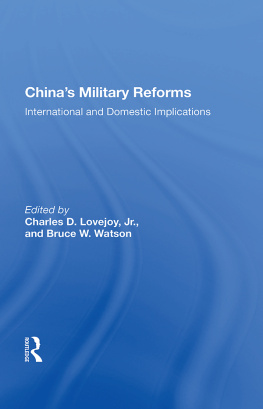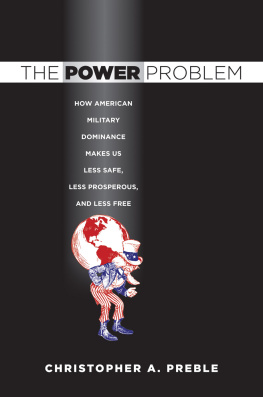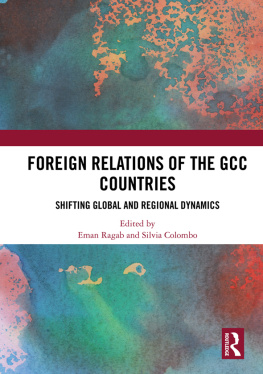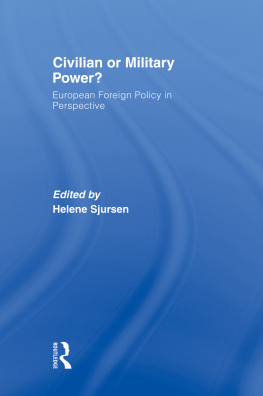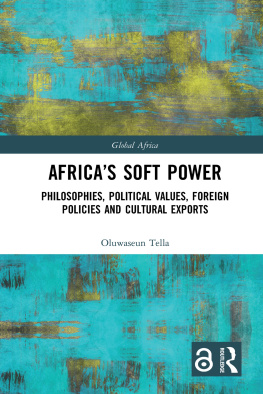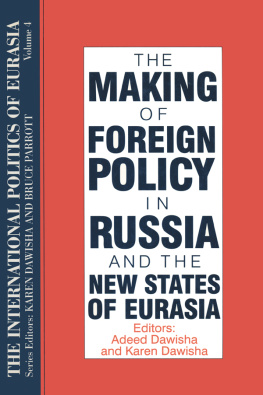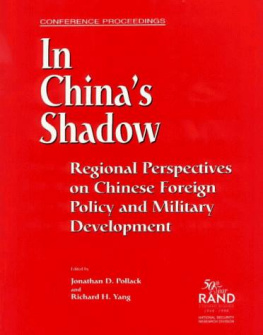ROUTLEDGE LIBRARY EDITIONS:
INTERNATIONAL SECURITY STUDIES
Volume 6
ESTIMATING FOREIGN MILITARY POWER
ESTIMATING FOREIGN MILITARY POWER
Edited by
PHILIP TOWLE
First published in 1982 by Croom Helm Ltd
This edition first published in 2021
by Routledge
2 Park Square, Milton Park, Abingdon, Oxon OX14 4RN
and by Routledge
52 Vanderbilt Avenue, New York, NY 10017
Routledge is an imprint of the Taylor & Francis Group, an informa business
1982 Philip Towle
All rights reserved. No part of this book may be reprinted or reproduced or utilised in any form or by any electronic, mechanical, or other means, now known or hereafter invented, including photocopying and recording, or in any information storage or retrieval system, without permission in writing from the publishers.
Trademark notice: Product or corporate names may be trademarks or registered trademarks, and are used only for identification and explanation without intent to infringe.
British Library Cataloguing in Publication Data
A catalogue record for this book is available from the British Library
ISBN: 978-0-367-68499-0 (Set)
ISBN: 978-1-00-316169-1 (Set) (ebk)
ISBN: 9780367714451 (Volume 6) (hbk)
ISBN: 9780367714468 (Volume 6) (pbk)
ISBN: 9781003150916 (Volume 6) (ebk)
Publishers Note
The publisher has gone to great lengths to ensure the quality of this reprint but points out that some imperfections in the original copies may be apparent.
Disclaimer
The publisher has made every effort to trace copyright holders and would welcome correspondence from those they have been unable to trace.
Estimating Foreign Military Power
EDITED BY PHILIP TOWLE
1982 Philip Towle
Croom Helm Ltd, 2-10 St Johns Road, London SW11
British Library Cataloguing in Publication Data
Estimating foreign military power.
1. Military history
2. Foreign relations History
I. Towle, Philip
355.033 U42
ISBN 0-7099-0434-7
Typesetting by Elephant Productions, London SE15
Printed and bound in Great Britain
by Billing and Sons Limited
Guildford, London, Oxford, Worcester
CONTENTS
List of Figures
List of Abbreviations
Introduction
Part One: Russia and the Soviet Union
2. Estimating Soviet Military Expenditure R. Huisken
3. Western Assessment of Soviet Strength G. Jukes
Part Two: The Power of the New States
4. British Estimates of Japanese Military Power, 1900-1914P.A Towle
5. Australian Estimates of the Japanese Threat, 1905-1941 DM Horner
6. Perceptions of Naval Power Between the Wars: the British Case G. Till
7. Nine Examples from Recent Indian Experience, 1962-1980 R. Rikhye
8. Assessing the Arab-Israel Military Balance Singh
Part Three
9. The Forgotten Dimensions of Strategy M.E. Howard
Notes on Contributors
4.1 The Far East in 1904-5
7.1 China, Northern India and East Pakistan
7.2 The Indo-Pakistan Frontier
8.1 The Middle East
I am grateful to Mr K. Blissett for providing the maps.
CIDCommittee of Imperial DefenceCIGSChief of the Imperial General StaffUAEUnited Arab EmiratesSSMSurface to surface missileECMElectronic counter measuresRPVRemotely piloted vehiclePGMPecision guided munitionPLOPalestine Liberation OrganisationSPSelf propelledAPCArmoured personnel carrierATGWAnti-tank guided weaponSAMSurface to air missileIAEAInternational Atomic Energy AgencyICBMIntercontinental ballistic missileIISSInternational Institute for Strategic StudiesSALStrategic Arms LimitationRUSIRoyal United Services InstituteACDAArms Control and Disarmament AgencyCIACentral Intelligence AgencyGNPGross National Product
Introduction to the 2021 Edition
When this book was published in 1982, we were still in the later years of the Cold War between the Soviet bloc and the West which had been raging for more than three decades. We thought it was important to assess what could be gleaned from past arms races to raise some of the appropriate questions about the existing situation; was the tendency to exaggerate or underestimate the power of a potential enemy, and why? Was correct intelligence about enemy forces available for those who would need to know it to prepare for war and, if not, why not?
Thus we divided the book into two sections, the first looking at Russia and the Soviet Union because they were the focus of Western anxieties, the second at what would now be called rising powers, Japan in the first half of the 20th Century and India in the second. We also included Israel and the Arab states, not so much because of their military strength, though that was considerable, but because the area had unfortunately been the focus of so much tension and conflict since 1945. The greatest omission was that we did not look at China because we failed to foresee that it might shake off the economic trappings of communism and unleash the age-old spirit of the entrepreneur in its people.
The three contributors to the first section of our book, Chris Bellamy, Ron Huisken and Geoffrey Jukes were all cautious about much of the commentary on the balance of conventional military power and expenditure between NATO and the Warsaw Pact. They stressed the difficulties caused by Moscows secrecy which made it somewhat easier to count the numbers of their tanks, aircraft and other weaponry than their quality. After the end of the Cold War, when Western officers could examine Warsaw Pact weapons, they found that many were old and in very poor condition. If counting equipment led to exaggeration of Soviet capability, Western belief that the Soviets were devoting a large proportion of their gross national product to defence proved correct. To this day, Russian people have apparently been willing to spend a much higher proportion of their budget on their armed forces than Western publics but then they have suffered more from foreign occupations than some Western states have done.
In the second section we looked at Japan because it was the only country to join the great powers in the first half of the 20th Century and a very restless new power it had been. Lord Salisbury once jibed that you never should trust experts. If you believe the doctors, nothing is wholesome: if you believe the theologians, nothing is innocent: if you believe the soldiers, nothing is safe. But Western countries were frequently surprised by Japans power and actions at that time. British leaders negotiated an alliance with Japan in 1902 to balance growing Russian naval power in East Asia yet they were surprised two years later when Japan attacked Russia and its armies defeated the Russians in every battle on land and sea. Despite this Geoffrey Till showed that in the 1930s many British naval and air force officers underestimated the Japanese threat out of cultural prejudice. They could not believe that the Japanese would make good aircraft carrier pilots. Yet British army officers who alone of the three Services were attachd to their Japanese counterparts were impressed by their competence and efficiency. The problem was that their reports were not widely circulated. Naval officers had also forgotten the laudatory views which their predecessors had held of the Japanese Navy when Japan was Britains ally. Nor did the Australians agree with British underestimates. David Horner explained this partly by geopolitics: to Australians the Japanese forces just looked more menacing than they did in London because they were so much closer. It is generally better to exaggerate than underestimate the strength of a potential enemy to formulate appropriate defence and foreign policies and, if war does still come, it will be less demoralising to military and civilian alike. The obvious disadvantage is that it leads to arms races.


